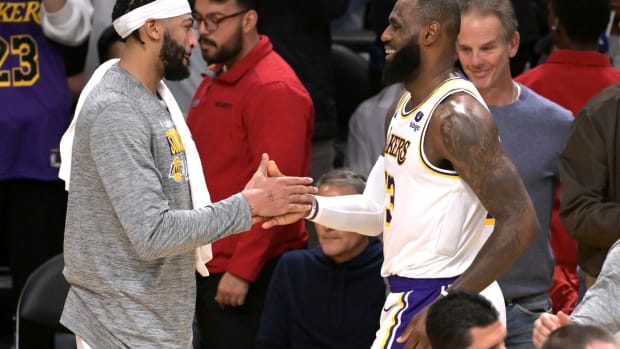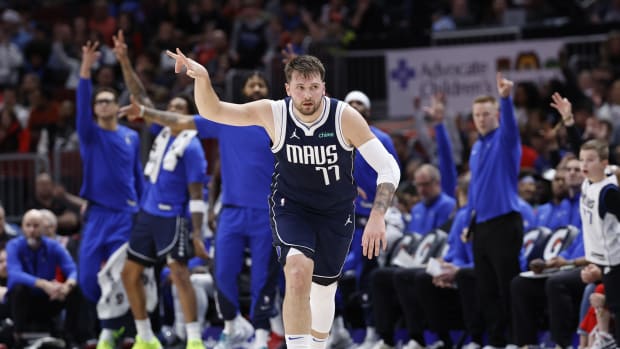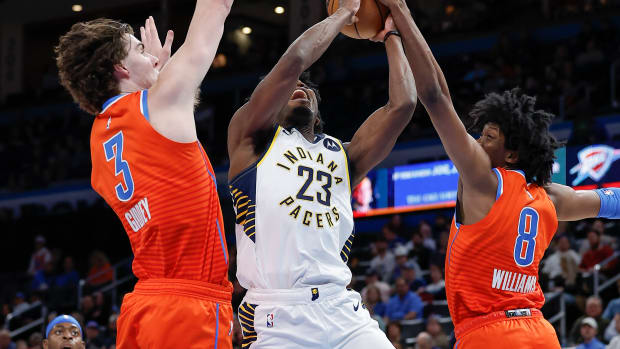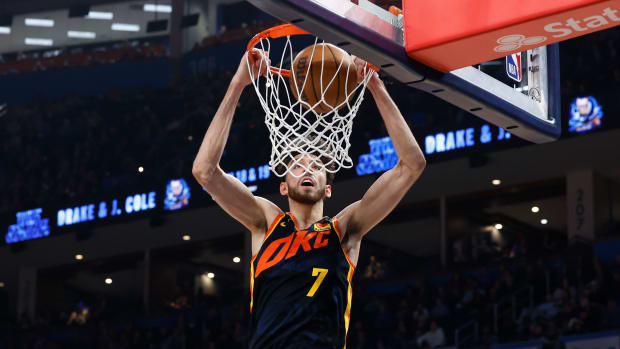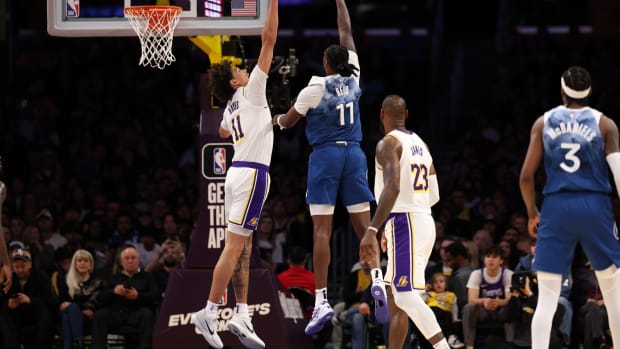Could LeBron James Become the First NBA Player Fined for Tampering?
Is LeBron James violating the NBA’s anti-tampering policy by helping the Los Angeles Lakers acquire New Orleans Pelicans star Anthony Davis? If so, will the NBA do anything about it?
As explained below, the Lakers’ pursuit of Davis, coupled with remarks by James and the agent for both James and Davis—Rich Paul of Klutch Sports—has sparked concerns about potential conflicts of interest and behind-the-scenes maneuvers that might constitute tampering.
Strained relationship between Davis, Pelicans headed for divorce
Through Paul, Davis recently informed the Pelicans that he would like to be traded to a team that can compete for a championship. Neither the Pelicans nor the NBA were pleased by what they perceive as a disruptive and franchise-damaging demand. On Tuesday, the NBA fined Davis $50,000 for using his agent to make a “public trade demand” in violation of a collectively bargained rule prohibiting such a maneuver. The league described Davis’s request as “an intentional effort to undermine the contractual relationship between Davis and the Pelicans.”
Although Davis intends to leave New Orleans, the Pelicans do not need to trade him anytime soon. Davis is under contract through the 2019-20 season, after which he could become a free agent.
Under Article II, Section 7 of the collective bargaining agreement, Davis has clear financial incentives to remain in New Orleans well into the next decade. If Davis plays out the remainder of the season with the Pelicans, he would be eligible to sign a five-year “designated veteran player” or “supermax” contract extension over the summer. Such a contract would be worth approximately $240 million and would reflect earnings up to 35% of the Pelicans’ salary cap. This type of contract would not be available to Davis if he is traded to another team since, as a new player to that franchise, he would no longer meet the requirements of a supermax extension. Davis could instead sign a five-year extension worth approximately $207 million (up to 30% of the team’s salary cap) with that new team. Or he could wait to become a free agent after the 2019-20 season and then be eligible to sign a four-year contract.
Even if it means sacrificing tens of millions of dollars, Davis wants out of New Orleans now. There is no shortage of suitors for him, with the Lakers, New York Knicks and Boston Celtics—who could likely offer the Pelicans the best return—considered the frontrunners to land the 25-year-old former Kentucky star. Davis, of course, possesses immense talents. He is widely considered one of the five best players in the league. The 6’10" power forward is also having yet another MVP-caliber season. Davis is averaging 29.3 points, 13.3 rebounds and 2.6 blocks per game in ’18-19. His Pelicans, on the other hand, are disappointments. At 22-28 and losers of three straight, the Pelicans are mired in 13th place in the Western Conference. They appear headed for the lottery and could be due for a franchise rebuild.
The Pelicans issued a statement on Monday acknowledging that the team received Davis’s trade request. The team also expressed that it fully understands Davis does not wish to sign a contract extension. Yet the team’s statement also made clear that the Pelicans will not be pushed into a hastily-negotiated trade with the NBA’s trade deadline of Feb. 7 fast approaching. Instead, the franchise will contemplate a Davis trade on their “terms” and on their “timeline.”
Davis’s trade preferences impact potential trade returns for Pelicans, Celtics’ trade plans
To the extent the Pelicans want to maximize their return in a Davis trade, the team would probably find it advantageous to wait until the summer. By that point, they would know much more about other teams’ assets. This is particularly true of the Celtics, who could be assigned up four first-round picks in the 2019 NBA Draft. The Celtics also have a deep roster with talented young players, including two former No. 3 overall picks, Jason Tatum and Jaylen Brown.
WOO: The Pelicans Can Afford to Wait for the Best Anthony Davis Offer
Further, the Celtics need to wait until the summer to trade for Davis—assuming they do not wish to trade their best player, Kyrie Irving, for Davis. The so-called “Derrick Rose” Rule forbids a team for trading for more than one player who signed a higher-value contract because the player had met certain achievements (both Davis and Irving, whom the Celtics traded for in 2017 and who is eligible to sign a new Celtics contract or pursue free agency this summer, are playing under such contracts). It is unlikely that the Celtics, who hope to compete for a championship this season, would trade their best player in the middle of the season (even if Irving’s backup, Terry Rozier, has played well as a starter). The Celtics would rather wait until the summer to sign Irving to a new contract and then trade for Davis. For their part, the Pelicans probably would not be interested in trading for Irving given that he is set to become a free agent. So, both teams have incentives to wait—despite Davis trying to engineer an earlier exit.
Another key hurdle for the Pelicans and Celtics in negotiating a Davis trade is found in a recent report by Yahoo! Sports’ Chris Haynes. According to Haynes, Davis doesn’t view Boston as a “top target.” It’s not clear why Davis is apparently lukewarm on Boston, but Haynes notes there is uncertainty as to whether Irving—who last year verbally committed to re-sign in Boston—will live up to his non-binding pledge and re-sign with the Green. While the Celtics could still trade for Davis and hope to convince him to stay, general manager Danny Ainge may be inclined to offer the Pelicans less in return if he believes Davis would only be a “rental” for the ’19-’20 season.
LeBron’s desire for Lakers to obtain Davis and NBA anti-tampering policies
With the Celtics potentially relegated to the background on Davis trade talks, the Lakers have become viewed as a more probable destination. This is largely because of James. And this is also where the situation could become potentially problematic for Davis, James and the Lakers.
In December, James told ESPN's Dave McMenamin that it would be “amazing” and “incredible” if the Lakers traded for Davis during the ’18-’19 season. James also cautioned that “I don't run the team” and that “obviously there's some things that need to be worked out on both sides.”
Given that they raise such obvious points, James’s comments to ESPN might appear completely harmless. After all, any NBA player would love to play with Davis. James stating as much doesn’t reveal anything.
That all may be true, but that’s not the applicable test for tampering in the NBA.
MANNIX: Pelicans' Future Depends on Handling of Davis Trade
Tampering refers to an owner, general manager, coach, scout, referee or player attempting to persuade a player, coach, trainer, general manager or any other person who is under contract with another team to join the tampering team. A prohibited “attempt” constitutes any direct or indirect endeavor to “entice, induce or persuade.” The relevant legal provisions for tampering are found in Articles 35 and 35A of the league’s constitution.
If enforced as it is literally worded, the anti-tampering rule would forbid many kinds of routine communications and interactions between NBA players. Players on different teams regularly speak with one another about the prospect of one day playing together. To that end, they openly recruit each other.
For instance, a couple of years ago, guard Isaiah Thomas acknowledged that he planned to recruit players at the All-Star Game (all of whom were obviously under contract with different teams) to join the Celtics, whom Thomas played for at the time. The NBA took no action. The same is true in 2017 when Golden State Warriors forward Draymond Green texted Kevin Durant in hopes of convincing the then-Oklahoma City Thunder star to play for the Warriors. It also proved true when Portland Trail Blazers guard C.J. McCollum posted an Instagram photo of Carmelo Anthony, who was under contract with the Knicks, wearing a Blazers uniform. The NBA doesn’t want to apply a “heavy-handed” approach to tampering. Along those lines, it would be futile for the league to try to stop players from engaging in ordinary communications. Further, such efforts would strike many as both paternalistic and invasive.
The NBA has previously punished the Lakers and other teams for tampering, but not punished players
Publicly-available records indicate that the NBA has never punished a player for tampering. The league came close to doing so in 1999. Back then, Chicago Bulls center Will Perdue, who had previously played with San Antonio Spurs center Tim Duncan, commented to media on Duncan’s free agency plans for the summer of 2000. “Tim Duncan is not married to San Antonio by any means,” Perdue observed. “He's made that very clear.” Although those remarks might seem mild and not directly tied to the Bulls, then-NBA commissioner David Stern believed they could nonetheless fall within the NBA’s definition of tampering. Perdue was admonished to choose his words more wisely.
The league has more aggressively pursued owners and team officials who tamper. Two such officials are persons whom James knows well: Lakers president of basketball operations Magic Johnson and Lakers GM Rob Pelinka. NBA commissioner Adam Silver recently twice fined the Lakers for tampering for remarks by Johnson and Pelinka.
Last June, the Lakers were fined $50,000 because of Johnson’s effusive praise of Milwaukee Bucks star Giannis Antetokounmpo. During an ESPN interview, Johnson, who ranks No. 4 on SI’s list of the greatest players in NBA history, spoke of talent and skill similarities between Antetokounmpo and himself. Johnson also predicted that Antetokounmpo would one day become an MVP and champion. Although the logic and truthfulness of those comments are hard to deny, the NBA does not want executives gushing over other teams’ players. Such flattery could be perceived as tampering overtures disguised as praise and adoration.
Staff: Five Anthony Davis Trades the Pelicans Should Consider
A year earlier, the NBA fined the Lakers $500,000 because of impermissible contact between Pelkina and Paul George’s agent, Aaron Mintz. Such contact amounted to tampering, even though the league did not find an actual plot for the Lakers to acquire George, who was under contract with the Indiana Pacers at the time. The NBA had retained the law firm Wachtell, Lipton, Rosen & Katz to investigate the Lakers. The league also made clear that the severity of the penalty in part reflected the Lakers disregarding a tampering warning issued to the team after Johnson had appeared on the Jimmy Kimmel Live on Apr. 21, 2017. During the interview, Johnson had lightheartedly discussed his interest in obtaining George.
There have been other notable findings of tampering by the NBA in recent history, including:
• In 2013, Sacramento Kings coach Michael Malone tampered by saying that Los Angeles Clippers guard Chris Paul would “look pretty good in a Sacramento Kings uniform.”
• In 2013, the Atlanta Hawks tampered by sending a season ticket letter that contained language expressing the Hawks’ interest in signing other teams’ free agents.
• In 2010, Dallas Mavericks owner Mark Cuban tampered by stating perhaps the most obvious comment of all time: The Mavericks would like to sign LeBron James, the greatest player of this generation, after James became a free agent.
• In 1995, the Miami Heat tampered by contacting Knicks head coach Pat Riley to join the Heat.
Two takeaway points: First, it is extremely easy for a team official or owner to get in trouble for tampering. All it takes is a favorable remark about a player who is under contract with another team and for that comment to be linked to the possibility of that player playing for another team. Second, the NBA elects to passively enforce the tampering rule as it relates to players. Players frequently “tamper” without consequence. This is at least in part because the league attempting to police player tampering would trigger its own set of adverse consequences.
The role of Rich Paul and potential tampering on behalf of James
As detailed above, James’s flattering comments to ESPN about Davis violate the language, but not spirit, of the anti-tampering rule. The NBA has long declined to sanction players for tampering even when those players are blatantly engaged in, well, tampering.
What is less clear is how the NBA would react to a player using an agent to pressure another team into trading a player who is under contract. If, hypothetically, James has convinced Paul to guide Davis out of New Orleans and towards the Lakers, the league may view the situation from a far more scrutinizing light.
To that point, the NBA is sensitive to concerns voiced by teams in smaller and medium markets that in spite of supermax contract extensions and other collectively-bargained rules designed to incentivize stars to remain with their teams, many stars seem to gravitate towards larger market teams once they become free agents. Durant is one example. Gordon Hayward, who left the Utah Jazz for the Celtics, is another. Davis will likely become another example. Through Paul, Davis is not only attempting to force the Pelicans to trade him but also trade him to one of two preferred teams—thought to be the Lakers or the Knicks—both of which happen to play in the two largest markets in the U.S.
Even if Paul is taking orders from James, he would likely not run afoul of the NBA. This is because Paul is not governed by the league’s anti-tampering policy found in Articles 35 and 35A of the NBA constitution. As worded, the policy governs players, owners, team executives, coaches, referees and other team employees as well as representatives of teams, owners or the NBA.
Player agents, in contrast, are governed by the National Basketball Players’ Association. The NBPA, like other players’ associations, is the exclusive bargaining representative of players pursuant to the National Labor Relations Act (the federal law that regulates unions and their pro sports incarnation, players’ associations). In order to gain the legal right to represent an NBA player, an agent must be certified by the NBPA and adhere to NBPA rules. In other words, player agents like Paul do not work for the NBA or its teams. They work only for the players and their right to negotiate contracts on behalf of players is only through the NBPA.
This does not mean that James could not get in trouble for Paul’s actions. Indeed, tampering includes any direct or indirect attempt to influence another player. If James is using Paul—who has been close to James since they were teenagers in Ohio—to tamper with Davis, it is arguably a more impactful form of tampering than James directly tampering. This is because Paul, unlike James, can make trade requests on behalf of the targeted client, Davis, and such requests can greatly disrupt an NBA franchise. The Pelicans would certainly attest to that disruption, particularly if Davis is motivated to steer the Pelicans away from a preferred trading partner (presumably the Celtics, with its quality trade assets and which play in the Eastern Conference).
The tampering investigation and what it could lead to
The NBA is investigating the Davis/Pelicans situation while also reminding teams to follow the anti-tampering rules. It will be up to Silver, as commissioner, to determine if tampering has occurred. Silver, who is an experienced attorney, will review available evidence and witness statements, including public remarks by James, Paul, team officials. Silver will also play close attention to statements made by NBA journalists that reflect off-the-record comments by “persons in the know.” As a private entity, the NBA lacks subpoena powers. However, the league constitution and other league documents contractually compel teams and their employees to fully cooperate in league investigations. Any decision by the commissioner would be final and non-appealable.
Much has been made of James’s close ties to Klutch Sports, but James reportedly does not own part of the agency. After he retires, James could take on equity in it. For now, however, James appears to be avoiding what would be an obvious conflict of interest in owning an agency that represents players on rival teams.
It’s also worth questioning how the NBA would uncover implicating evidence of a plot. This plot would presumably be led by James and transmitted through Paul with the goal of prying Davis away from the Pelicans. Paul has a fairly obvious and logical defense to what he would dismiss as a conspiracy theory: he is simply looking out for the best interests of a client, Davis, who understandably wants to play for a championship team and the Pelicans are clearly not such a team. The fact that Paul also represents James, Paul would argue, is mere happenstance and irrelevant. Paul would stress that he also represents Ben Simmons, John Wall and several other “marquee” players and what he does for one is not directed by the other.
If Silver nonetheless concludes that James has tampered and that its uniquely deleterious qualities—franchise disruption—warrant a punishment, Silver would be authorized under Article 35 to suspend James for a definite or indefinite period and/or impose a fine of up to $50,000. Given the absence of precedent of player punishment over tampering, it seems unlikely that James would face a meaningful punishment. Since James is reportedly worth in the ballpark of $450 million and a $50,000 would be drop in that bucket, a meaningful punishment would only constitute a suspension.
The more interesting scenario would be if the NBA concludes that the Lakers (or another team) tampered in a pursuit of Davis. Under Article 35A, Silver could punish the team through:
• Fine of up to $5 million
• Suspension of a team official for a definite or indefinite period
• Forfeiture of draft packs
• Transfer of draft picks to the Pelicans
• Prohibiting the tampering team from acquiring Davis
Notice the last potential penalty: if a team is found to have tampered in an attempt to obtain Davis, Silver could forbid the team from obtaining Davis. That would be a true game-changer and perhaps a victory for small and media market teams. To be clear, the NBA has never imposed such a penalty. It didn’t punish any of the tampering teams mentioned above (including the Lakers) in such a way. Instead, they were all fined and, in the case of the Heat, forced to transfer a first-round pick to the Knicks.
But there is always an opportunity for a first time.
The Crossover will keep you posted on Davis and tampering.
Michael McCann is SI’s legal analyst. He is also Associate Dean of the University of New Hampshire School of Law and editor and co-author of The Oxford Handbook of American Sports Law and Court Justice: The Inside Story of My Battle Against the NCAA.


































